Currency Act, Documents »
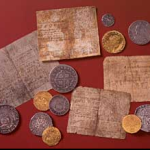
The following is the original text of the Currency Act of 1751.
WHEREAS the Act of Parliament made in the sixth Year of her late Majesty Queen Anne, intituled An Act for ascertaining the Rate of foreign Coins in her Majesty’s Plantations in America, hath been intirely frustrated in his Majesty’s said Colonies of Rhode Island and Providence Plantations, Connecticut, the Massachusets Bay, and New Hampshire in America, by their creating and issuing, from Time to Time, great Quantities of Paper Bills of Credit, by virtue of Acts of Assembly, Orders, …
Currency Act, Documents »
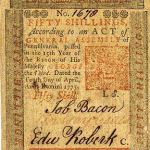
The following is the original text of the Currency Act of 1764.
WHEREAS great quantities of paper bills of credit have been created and issued in his Majesty’s colonies or plantations in America, by virtue of acts, orders, resolutions, or votes of assembly, making and declaring such bills of credit to be legal tender in payment of money: and whereas such bills of credit have greatly depreciated in their value, by means whereof debts have been discharged with a much less value than was contracted for, to the great discouragement and …
Currency Act, Timeline of British Acts on America »
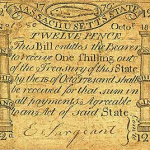
What was the Currency Act of 1751?
The Currency Act of 1751 prohibited the issue of new bills of credit by New England colonies: Rhode Island, Massachusetts Bay, New Hampshire and Connecticut. Parliament decided to enact the Currency Act of 1751 to control currency depreciation against silver and sterling and to ensure its value for payments of debt to British merchants. extended the policy to all British colonies in the Americas increasing more tension between Britain and America.
Why was the 1751 Currency Act passed?
Most of the hard currency and revenues in …
British Taxation in Colonial America »
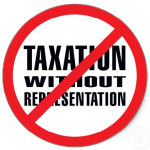
The Navigation Acts were trade rules that governed commerce between Britain and its colonies. The first of the Navigation Acts existed for almost two centuries and was repealed in 1849. The laws were designed to protect British economic interests in colonial trade and to protect its industry against the rapidly growing Dutch navigation trade.
The purpose of the Molasses Act was to protect British West Indies exports to the American colonies from the more fertile French and Spanish islands of Martinique and Santo Domingo. It was not designed to raise revenue …
British Taxation in Colonial America »
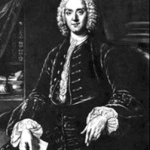
During the first eight years of King George III reign the British government had six ministries. British politics was in a state of chaos and political infighting between Whig groups disrupted colonial policy.
In the last years of King George II, Britain was unified under the leadership of William Pitt who had led Britain to war against the French in North America and India. The war had been costly and Britain was highly indebted however Pitt wanted to declare war on Spain before Spain attacked Britain. Not finding support among George …
Headline »
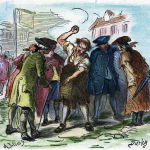
There were twelve years between the signing of the Treaty of Paris on February 1763 and the ride of Paul Revere on April 1775. Tension and anger between colonists and the empire increasingly rose to the point of no return. During the short period of 1762-1770 the causing disruption in its colonial policy. Furthermore, it found itself fighting wars in Europe, West Indies and Asia which drastically increased the cost of servicing its national debt. At the top of its agenda was the lightening of the burden on British …
British Taxation in Colonial America, Stamp Act »
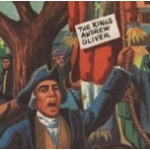
Up until the attempt to collect the Stamp duty colonists had accepted minor duties on trade such as the , and even the . cost more to administer than it collected in revenue. Those measures were not considered as “tax” by the colonial assemblies but as trade regulations that compensated for protection, access to foreign products and a foreign market for American goods.
Colonists were careful to draw distinction between internal and external taxes. Internal taxes were those imposed by the provincial government, members of which were elected by residents, …
Sugar act »

It was known as the in America and titled American Revenue Act by Britih Parliament.
The Sugar Act was passed by Parliament on April 5, 1764.
It was introduced by Prime Minister George Grenville as a permanent act.
The Sugar Act replaced the that was about to expire.
The Act consists of 47 clauses that stipulate rates and duties, restrictions on trade, requirements for shippers, penalties and provisions for prosecution.
Its purpose was to undermine illegal trade and raise revenue to pay for debt incurred during the French Indian War and to pay for …
British Taxation in Colonial America, Stamp Act »

Proponents of an American Stamp Duty were found on both sides of the Atlantic but most supporters were in Britain. One of the most vocal British opponents on the American tax was William Pitt, the Earl of Chatham, who led Britain to victory during the French Indian War. Edmund Burke, a statesman and philosopher, strongly opposed the tax and supported American independence. Most merchants also opposed taxation.
British expenditure during the French Indian War almost doubled Britain’s debt. During that period the government borrowed heavily, about four-fifth of the total amount …
Stamp Act »
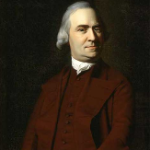
Representatives from nine colonies attended the Stamp Act Congress.
From Massachusetts: James Otis, Samuel Adams, Oliver Partridge and Timothy Ruggles.
From Rhode Island: Henry Ward and Metcalf Bowler
From Connecticut: William Johnson, Eliphalet Dyer and David Rowland.
From New York: Phillip Livingston, William Bayard, John Cruger, Robert Livingston and Leonard Lispinard.
From Pennsylvania: John Morton, George Bryan and John Dickinson.
From New Jersey: Hendrick Fisher, Robert Ogden and Joseph Gordon.
From Delaware: Caesar Rodney and Thomas McKean.
From Maryland: Edward Tilghman, Thomas Ringgold and William Murdock.
From South Carolina: John Rutledge, Thomas Lynch and Christopher Gadsden.
Secretary: John Cotton
President: Timothy …


